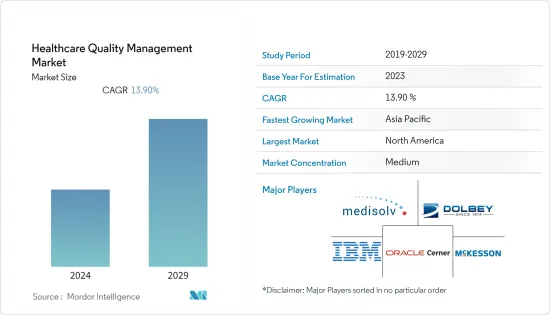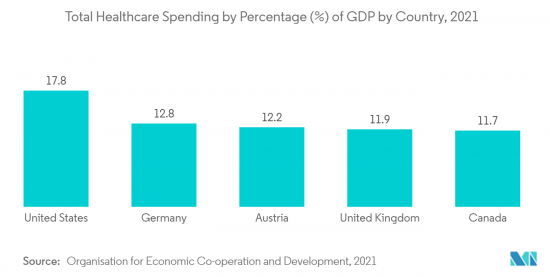 |
市場調査レポート
商品コード
1404429
ヘルスケア品質管理-市場シェア分析、業界動向・統計、成長予測2024年~2029年Healthcare Quality Management - Market Share Analysis, Industry Trends & Statistics, Growth Forecasts 2024 - 2029 |
||||||
● お客様のご希望に応じて、既存データの加工や未掲載情報(例:国別セグメント)の追加などの対応が可能です。 詳細はお問い合わせください。
| ヘルスケア品質管理-市場シェア分析、業界動向・統計、成長予測2024年~2029年 |
|
出版日: 2024年01月04日
発行: Mordor Intelligence
ページ情報: 英文 113 Pages
納期: 2~3営業日
|
- 全表示
- 概要
- 目次
医療品質管理市場は予測期間中に13.9%のCAGRが見込まれています。

COVID-19パンデミックは、医療品質管理市場を含む医療産業に大きな影響を与えています。パンデミックは、特にリモートワークや遠隔医療をサポートする品質管理ソリューションに対する需要の急増を生み出しました。また、品質管理ソフトウェアを含む医療におけるデジタル技術の採用も加速しました。多くの医療プロバイダーは、品質管理プロセスを自動化し、手作業を減らし、ワークフローを合理化する方法を模索しました。パンデミックの間、病院や医療センターを訪れる患者の数は大幅に減少しました。例えば、2021年2月にBritish Medical Journalが発表した研究によると、パンデミックの間、医療の利用は約3分の1減少し、重症でない人の間で大きなばらつきがあり、より大きな減少が見られ、それによって市場の成長に影響を与えました。パンデミック後、医療品質管理ソフトウェアは、企業がコロナウイルスの影響から回復するのを支援し、リスク管理やその他の業務上の課題により効率的に取り組むことを可能にするため、予測期間における市場の牽引役となることが期待されます。
医療の品質管理市場は、医療提供者の品質とパフォーマンスを向上させるための医療制度に対する政府の義務付け、医療における非構造化データの増加、高齢化などにより、着実に成長しています。例えば、2023年2月にNCBIが発表した論文によると、ここ数年、死亡率を予測するための非構造化電子カルテ(EHR)データが増加しています。同出典によれば、非構造化データはEHRの80%を占めています。この非構造化データには、フリーテキストの臨床記録、画像診断、検査報告が含まれます。このように、膨大な量の非構造化データは、非構造化データから価値ある洞察を引き出すための新たな技術開発を生み出すと予測されています。
さらに、主要参入企業の技術的進歩が製品発売の増加につながり、市場成長を促進しています。例えば、2021年9月、フロリダ州は、ホスピス設定、長期介護施設、刑務所で患者に薬を与えるために自動薬局調剤システムを使用することを承認しました。さらに、革新的な製品を発売するための主要市場参入企業間の協力関係の高まりは、採用の増加により成長を促進すると予想されます。例えば、2021年11月、Crothall Healthcareの医療技術ソリューション(HTS)部門は、Intelexとの提携により、ウェブベースの品質管理システム専用プラットフォームであるチームクエストを発売しました。これにより、病院でのこのような製品の導入がさらに進み、市場成長の原動力となることが期待されます。最新技術の進化に伴い、医療サービスのコストは上昇し、発展途上国や低開発国の医療提供者のパフォーマンスに影響を与えています。各国の政府は、標準的な品質レベルを得るために世界の努力を行っています。このような政府の義務付けは、世界の医療品質管理市場の成長を後押ししています。
しかし、品質報告システムのコスト上昇や品質管理ソフトウェアに関連するデータセキュリティの問題は、市場の成長を妨げる他の要因となっています。
医療品質管理市場の動向
ビジネスインテリジェンス・アナリティクスソリューション分野が予測期間中に大きな成長を記録する見込み
ビジネスインテリジェンス・アナリティクスソリューション分野は、調査市場において大きなシェアを占めています。ビジネスインテリジェンス・アナリティクスソリューションがこのセグメントで大きな割合を占めている主要理由は、高騰する運営コストの削減に対する医療プロバイダーのニーズ、質の高い医療に対する需要の高まり、バリューベースケアを推進する政府の施策、保険会社から拒否される請求件数の増加などです。
2022年1月にMultidisciplinary Digital Publishingが発表した調査によると、ビジネス・インテリジェンスとアナリティクス(BIとA)ツールは、施設のパフォーマンスを精緻化し、測定可能な新しい施設管理の主要業績評価指標(KPI)を発見する有望な機会を提供する可能性があります。パフォーマンスを向上させるこれらのソリューションの重要性が高まるにつれ、医療の採用が増加し、予測期間中のこのセグメントの成長を促進します。
さらに、先進的なビジネスインテリジェンスと分析ソリューションの立ち上げに市場参入企業が積極的に参加していることも、市場成長を急成長させています。例えば、スノーフレークは2022年3月、医療業界向けにクラウドベースのデータ共有プラットフォームを発表しました。このプラットフォームは、同社の中核的なデータウェアハウス、分析、ビジネスインテリジェンスをデータマーケットプレースやオンデマンドコンサルティングサービスと統合したものです。また、マイクロソフトは2022年3月、様々な形態の患者データを管理・分析するためのクラウドベースのプラットフォームであるAzure Health Data Servicesの一般提供を発表しました。Azure Health Data Services platform-as-a-service(PaaS)は、組織が複数のデータストアに分散する保護されるべき医療情報(PHI)を管理し、より少ない時間とリソースで患者データを扱い、理解できるようにします。したがって、技術的に高度な製品の発売が市場の成長を促進しています。
そのため、ビジネスインテリジェンス(BI)は、医療業界における洞察力の獲得、コスト削減、収益の増加、患者の安全性の向上に役立っています。BIはまた、エビデンスに基づく臨床上の意思決定を提供することで、患者ケアと転帰の改善にも役立ちます。これにより、医師は患者の診断をモニターし、予測することができます。現在進行中の開発により、医療部門の質はエビデンスに基づく医薬品とデータの適切な使用によって左右されます。さらに、医療支出の増加も、予測期間中のビジネスインテリジェンスと分析ソリューションセグメントの成長を促進すると予測されています。例えば、OECDが発表した「Health at Glance 2021」レポートによると、GDPに占める総医療費の割合は米国が約17.8%、次いでドイツが12.8%、オーストリアが12.2%、英国が11.9%となっています。
したがって、この市場セグメントは、上記の要因によって予測期間中に大きな成長を示すと予想されます。

北米が市場で大きなシェアを占め、予測期間中も同様の推移が予想される
北米は市場調査において大きなシェアを占めています。これは主に、より良い償還施設と品質管理サービスの実施における政府の関与によるものであり、予測期間中の市場の成長を増大させると予想されます。
この地域の主要企業による製品発売の増加は、医療業界全体でこれらのソリューションの採用を増加させ、それによって市場成長を促進しています。例えば、2021年8月、ライフサイエンスエコシステム全体のためのクラウド品質管理システムソフトウェアであるQualioは、Qualioの電子品質管理ソフトウェア(eQMS)内の新製品であるデザインコントロールを発売しました。これは、製品開発と品質管理を単一のワークストリームに統合し、コンプライアンスと規制当局の承認をサポートする詳細な文書を自動的に生成することによって、医療機器メーカーの市場投入までの時間短縮を支援するものです。
さらに、NCBIが2023年2月に発表した論文によると、米国では毎年約7,000~9,000人が投薬ミスで死亡しています。さらに、何10万人もの患者が副作用やその他の薬物合併症を経験しているが、多くの場合、報告されていないです。このように、医療システムにおける医療過誤の増加は、医療品質管理ソリューションの採用拡大につながり、この地域の成長を促進します。
したがって、上記の要因から、北米は医療品質管理システムの成長機会を創出し、分析期間中の市場全体の成長を促進すると予測されます。
医療品質管理業界概要
医療品質管理市場は、企業が買収や合併、カスタマイズ型ソリューションの提供、未開拓の商業市場における企業の拡大に継続的に注力しているため、競合分析によると、競争は中程度です。さらに、企業は商業化戦略の一環として、機能を強化・改善した新製品やプラットフォームの開発に巨額の投資を行っています。市場を独占している主要企業には、Medisolv Inc.、Surescripts LLC、Oracle(Cerner Corporation)、IBM、McKesson Corporation、Surescripts LLCなどがあります。
その他の特典
- エクセル形式の市場予測(ME)シート
- 3ヶ月間のアナリストサポート
目次
第1章 イントロダクション
- 調査の前提条件と市場定義
- 調査範囲
第2章 調査手法
第3章 エグゼクティブサマリー
第4章 市場力学
- 市場概要
- 市場促進要因
- 医療プロバイダーの質とパフォーマンスを向上させるための医療システムに対する政府の義務付け
- 医療における非構造化データの増加
- 高齢化人口の増加
- 市場抑制要因
- 品質報告システムの実装に関連するコスト
- 品質管理ソフトウェアに関連するデータセキュリティの問題
- ポーターのファイブフォース分析
- 供給企業の交渉力
- 買い手/消費者の交渉力
- 新規参入業者の脅威
- 代替品の脅威
- 競争企業間の敵対関係の強さ
第5章 市場セグメンテーション(市場規模(単位:100万米ドル))
- ソフトウェアタイプ別
- ビジネスインテリジェンスと分析ソリューション
- 医師品質報告ソリューション
- 臨床リスク管理ソリューション
- 医療機関パフォーマンス改善ソリューション
- 提供形態別
- クラウド型ソリューション
- オンプレミス型ソリューション
- 用途別
- データ管理
- リスク管理
- エンドユーザー別
- 病院
- 外来医療センター
- その他のエンドユーザー
- 地域別
- 北米
- 米国
- カナダ
- メキシコ
- 欧州
- ドイツ
- 英国
- フランス
- イタリア
- スペイン
- その他の欧州
- アジア太平洋
- 中国
- 日本
- インド
- オーストラリア
- 韓国
- その他のアジア太平洋
- 中東・アフリカ
- GCC諸国
- 南アフリカ
- その他の中東とアフリカ
- 南米
- ブラジル
- アルゼンチン
- その他の南米
- 北米
第6章 競合情勢
- 企業プロファイル
- Oracle(Cerner Corporation)
- Change Healthcare
- CitiusTech Inc.
- Dolbey Systems Inc.
- McKesson Corporation
- Medisolv Inc.
- Microsoft Corporation(Nuance Communications Inc.)
- Premier Inc.
- RLDatix
- IBM
- Compass Group(Crothall Healthcare Inc.)
第7章 市場機会と今後の動向

The healthcare quality management market is expected to witness a CAGR of 13.9% during the forecast period.
The COVID-19 pandemic has significantly impacted the healthcare industry, including the healthcare quality management market. The pandemic has created a surge in demand for quality management solutions, particularly those that support remote working and telehealth. It also accelerated the adoption of digital technologies in healthcare, including quality management software. Many healthcare providers sought ways to automate quality management processes, reduce manual tasks, and streamline workflows. Patient traffic towards hospitals and healthcare centers has decreased significantly during the pandemic. For instance, according to the study published by a British Medical Journal in February 2021, healthcare utilization declined by about a third during the pandemic, with significant variation and more considerable decreases among persons with less severe illnesses, thereby impacting the market growth. Post-pandemic, the healthcare quality management software will assist businesses in recovering from the effects of the coronavirus, allowing them to work more efficiently on risk management and other operational challenges, thereby expected to drive the market in the forecast period.
The healthcare quality management market is growing steadily due to the government mandates for the healthcare systems to improve the quality and performance of the healthcare providers, the increasing amount of unstructured data in healthcare, and the aging population. For instance, as per the article published by the NCBI in February 2023, in the recent few years, there has been an increase in the unstructured electronic health record (EHR) data for predicting mortality in the recent few years. As per the same source, the unstructured data comprise 80% of EHR. This unstructured data includes free-text clinical notes, diagnostic imaging, and laboratory reports. Thus, the enormous amount of unstructured data is projected to create new technological developments to help extract valuable insights from unstructured data.
Furthermore, the key player's technological advancements have led to increased product launches, driving market growth. For instance, in September 2021, Florida approved using automated pharmacy dispensing systems to give medication to patients in hospice settings, long-term care institutions, and prisons. Moreover, rising collaborations among key market players to launch innovative products are expected to drive growth due to increased adoption. For instance, in November 2021, Crothall Healthcare's Healthcare Technology Solutions (HTS) division launched a team quest, a dedicated web-based Quality Management System platform in partnership with Intelex. This will further lead to increased adoption of such products in the hospitals, thereby expected to drive the market growth. As the latest technologies are evolving, the cost of healthcare services is increasing, affecting the performance of healthcare providers in developing or underdeveloped nations. Governments in various countries are making efforts worldwide to obtain a standard level of quality. Such government mandates are helping the growth of the healthcare quality management market worldwide.
However, higher costs of quality reporting systems and data security issues associated with quality management software are the other factors hindering market growth.
Healthcare Quality Management Market Trends
Business Intelligence and Analytics Solutions Segment is Expected to Register a Significant Growth Over the Forecast Period
The business intelligence and analytics solutions segment holds a significant market share in the market studied. Business intelligence and analytics solutions have a large percentage of this segment, which can primarily be attributed to the need of healthcare providers to reduce the soaring operating costs, rising demand for quality healthcare, government measures to promote value-based care, and the increasing number of claims denied from insurers.
According to the study published by Multidisciplinary Digital Publishing in January 2022, business intelligence and analytics (BI and A) tools might provide a promising opportunity to elaborate on facility performance and uncover measurable new facility management key performance indicators (KPIs) since present KPIs are too crude to discover the actual performance of facilities. The rising importance of these solutions to improve performance will lead to increased healthcare adoption, thereby driving this segment's growth over the forecast period.
In addition, the active participation of prominent players in the launch of advanced business intelligence and analytical solutions is also burgeoning the market growth. For instance, in March 2022, Snowflake launched a cloud-based data-sharing platform for the healthcare industry that integrates the company's core data warehousing, analytics, and business intelligence offerings with a data marketplace and on-demand consulting services. Also, in March 2022, Microsoft announced the general availability of Azure Health Data Services, a cloud-based platform for managing and analyzing various forms of patient data. The Azure Health Data Services platform-as-a-service (PaaS) helps organizations manage disparate forms of protected health information (PHI) across multiple data stores, letting them work with -- and make sense of -- patient data using less time and resources. Hence, the launch of technologically advanced products is driving market growth.
Therefore, business intelligence (BI) is helping the healthcare industry gain insights, reduce costs, increase revenue, and improve patient safety. BI can also help improve patient care and outcomes by providing evidence-based clinical decision-making. This allows physicians to monitor and predict the diagnosis of patients. Owing to the ongoing development, the healthcare sector's quality is influenced by evidence-based medicines and appropriate use of the data. Moreover, the rising healthcare spending is also projected to drive the growth of the business intelligence and analytics solutions segment during the forecast period. For instance, according to the Health at Glance 2021 report published by the OECD, the total health spending by the percentage of GDP was around 17.8% in the United States, followed by Germany at 12.8%, Austria at 12.2%, and the United Kingdom at 11.9%.
Thus, the market segment is expected to show significant growth over the forecast period due to the abovementioned factors.

North America Holds a Significant Share in the Market And Is Expected to Do the Same During the Forecast Period
North America holds a significant share of the market studied. This can be primarily attributed to better reimbursement facilities and the government's involvement in implementing quality management services, which are expected to augment the market's growth over the forecast period.
Rising product launches by the key player of this region have led to increased adoption of these solutions across the healthcare industries, thereby driving the market growth. For instance, in August 2021, Qualio, a cloud quality management system software for the entire life sciences ecosystem, launched design controls, a new product within Qualio's electronic quality management software (eQMS) that aids medical device manufacturers in reducing time to market by combining product development and quality management into a single work stream and automatically generating detailed documentation to support compliance and regulatory approvals.
Furthermore, according to the article published by NCBI in February 2023, around 7,000 to 9,000 people in the United States die from medication errors every year. Moreover, hundreds of thousands of other patients experience but often do not report an adverse reaction or other medication complications. Thus, the increased medical errors in the healthcare systems will lead to increased healthcare quality management solutions adoption, thereby driving growth in this region.
Hence, as per the abovementioned factors, North America is anticipated to create opportunities for healthcare quality management systems, thereby driving the overall market growth over the analysis period.
Healthcare Quality Management Industry Overview
The healthcare quality management market is moderately competitive as per the competitive analysis owing to the companies continuously focusing on acquisitions and mergers, provisions of solutions, which are customised, and expansion of companies in untapped commercial markets. Moreover, companies are investing massive amounts in developing new products and platforms with enhanced and improved features as a part of a commercialisation strategy. Some major players dominating the market include Medisolv Inc., Surescripts LLC, Oracle (Cerner Corporation), IBM, McKesson Corporation, and Surescripts LLC, among others.
Additional Benefits:
- The market estimate (ME) sheet in Excel format
- 3 months of analyst support
TABLE OF CONTENTS
1 INTRODUCTION
- 1.1 Study Assumptions and Market Definition
- 1.2 Scope of the Study
2 RESEARCH METHODOLOGY
3 EXECUTIVE SUMMARY
4 MARKET DYNAMICS
- 4.1 Market Overview
- 4.2 Market Drivers
- 4.2.1 Government Mandates for the Healthcare Systems to Improve the Quality and Performance of the Healthcare Providers
- 4.2.2 Increasing Amount of Unstructured Data in Healthcare
- 4.2.3 Increase in Aging Population
- 4.3 Market Restraints
- 4.3.1 Cost Associated with the Implementation of the Quality Reporting Systems
- 4.3.2 Data Security Issues Associated with the Quality Management Software
- 4.4 Porter's Five Forces Analysis
- 4.4.1 Bargaining Power of Suppliers
- 4.4.2 Bargaining Power of Buyers/Consumers
- 4.4.3 Threat of New Entrants
- 4.4.4 Threat of Substitute Products
- 4.4.5 Intensity of Competitive Rivalry
5 MARKET SEGMENTATION (Market Size by Value - in USD Million)
- 5.1 By Software Type
- 5.1.1 Business Intelligence and Analytics Solutions
- 5.1.2 Physician Quality Reporting Solutions
- 5.1.3 Clinical Risk Management Solutions
- 5.1.4 Provider Performance Improvement Solutions
- 5.2 By Mode of Delivery
- 5.2.1 Cloud-based Solutions
- 5.2.2 On-premise Solutions
- 5.3 By Application
- 5.3.1 Data Management
- 5.3.2 Risk Management
- 5.4 By End User
- 5.4.1 Hospitals
- 5.4.2 Ambulatory Care Centers
- 5.4.3 Other End Users
- 5.5 Geography
- 5.5.1 North America
- 5.5.1.1 United States
- 5.5.1.2 Canada
- 5.5.1.3 Mexico
- 5.5.2 Europe
- 5.5.2.1 Germany
- 5.5.2.2 United Kingdom
- 5.5.2.3 France
- 5.5.2.4 Italy
- 5.5.2.5 Spain
- 5.5.2.6 Rest of Europe
- 5.5.3 Asia-Pacific
- 5.5.3.1 China
- 5.5.3.2 Japan
- 5.5.3.3 India
- 5.5.3.4 Australia
- 5.5.3.5 South Korea
- 5.5.3.6 Rest of Asia-Pacific
- 5.5.4 Middle East and Africa
- 5.5.4.1 GCC
- 5.5.4.2 South Africa
- 5.5.4.3 Rest of Middle East & Africa
- 5.5.5 South America
- 5.5.5.1 Brazil
- 5.5.5.2 Argentina
- 5.5.5.3 Rest of South America
- 5.5.1 North America
6 COMPETITIVE LANDSCAPE
- 6.1 Company Profiles
- 6.1.1 Oracle (Cerner Corporation)
- 6.1.2 Change Healthcare
- 6.1.3 CitiusTech Inc.
- 6.1.4 Dolbey Systems Inc.
- 6.1.5 McKesson Corporation
- 6.1.6 Medisolv Inc.
- 6.1.7 Microsoft Corporation (Nuance Communications Inc.)
- 6.1.8 Premier Inc.
- 6.1.9 RLDatix
- 6.1.10 IBM
- 6.1.11 Compass Group (Crothall Healthcare Inc.)
